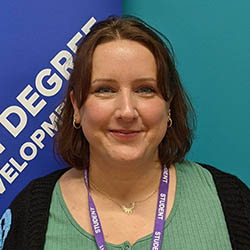Early Years Educator (Apprenticeship)
Early Years Educators, and other job roles such as nursery nurse and childminders, are highly trained professionals who play a key role in ensuring that young children learn and develop well and are kept healthy and safe. They work in a range of settings including full day care, children's centres, pre schools, reception classes and as childminders. They may either be working on their own or supervising others to deliver the Early Years Foundation Stage (EYFS) requirements set by Government for the learning, development and care of children from birth to 5 years old.
Apprenticeship Standard ST0135

Elizabeth Lefever
I’ve always wanted to work in the childcare industry and chose this course as the best option to further my career. I like the fact that I have work placements in nurseries and schools to get more experience and become more confident. The support staff and teachers are happy to help and full of encouragement.
Child Care

Laura Pearce
As a teaching assistant, I find the course extremely relevant to my job. The course has taught me a lot about children’s learning development, and I’m applying what I’ve learnt so far within my role at the school where I work. Studying for a degree in Newbury is an advantage to me. I was thrilled that UCN’s partnership with the University of Reading made this possible for me. More...
Foundation Degree in Children's Development and Learning
-
Description
An Early Years Educator:
- Plans and supervises child initiated and adult led activities which are based around the needs and interests of each individual child
- Supports children to develop numeracy and language skills through games and play
- Has key person responsibility to help ensure each child feels safe and secure
- Observes each child and shapes their learning experience to reflect their observations
- Meets the care needs of the individual child such as feeding, changing nappies and administration of medicine
- Works in partnership with other colleagues, parents and/or carers or other professionals to meet the individual needs of each child
With additional experience, an Early Years Educator can become the manager of an early years setting
Individuals will undergo all the checks as per the EYFS requirements to ensure suitability to work with children.
An apprenticeship is a genuine job and under all circumstances an apprentice will be employed from day one. Apprenticeships combine practical training in a job with study.
-
Entry Requirements
Apprenticeships are available to anyone over the age of 16, living in England and have no upper age limit. Any vacancies will clearly state what the entry requirements are for the job role being advertised. There will be different entry requirements depending on the company and role.
A minimum 5 GCSEs at grade 4/C or above, including maths and English are recommended for this apprenticeship. Individuals without level 2 English and maths will need to achieve this level and take the test for level 2 English and maths prior to taking the end-point assessment.
Applicants will need to undertake an Enhanced Disclosure and Barring Service (DBS) process and provide the result prior to starting.
Candidates should have a willingness to learn independently and apply learning in their current workplace. Access to a computer and basic IT skills are essential to complete assignments and other elements of the programme.
-
Qualification
Apprenticeship Standard ST0135 Early Years Educator CACHE Level 3 Early Years Educator
-
Progression
This apprenticeship provides an ideal entry into the occupation and supports progression within the sector.
-
Assessment
Through their apprenticeship, apprentices gain the technical knowledge, practical experience and wider skills they need for their job and career. Apprentices will have their skills, knowledge and behaviours evaluated at the end of their apprenticeship by taking an end-point assessment (EPA). This is known as synoptic assessment. Individuals without level 2 English and maths will need to achieve this level and take the test for level 2 English and maths prior to taking the end-point assessment.
-
Home Study
The apprentice is expected to study through a mix of learning in the workplace, formal off-the-job training and the opportunity to practise new skills in a real work environment. The time spent on off-the-job training should be at least 20% and should be included as part of working hours. The employer must allow time to complete the apprenticeship within the working hours, however, some homework may be set by College Tutors or Development Coaches.
-
Work Placement
This is a work-based programme and is studied as part of an apprenticeship.
-
Fees and Additional Costs
If you are between the ages of 16 and 24, you will not have to fund your own tuition, it is your employer and the government who cover the fees. If you are over 25, you may be asked to contribute towards the cost of your training, but it depends on your employer. If you do have to contribute to the cost of training, you may be eligible for an Advanced Learner Loan.
The cost of training an apprentice is dependent on their age and whether or not the business pays the Apprenticeship Levy. There are a range of different grants and incentives available to employers. Contact us for up-to-date information and advice on the funding support available.
| Code | Start | End |
|---|---|---|
| AP/3EYE/S 232501 | Flexible Start |
* Terms and conditions apply. The fees stated on this website are for guidance purposes only and should be checked before enrolment. Unless otherwise stated, fees shown are for tuition only, over one academic year. Where a course is longer than one academic year, the fees stated are for the first year, and the cost of the second or subsequent years will be discussed at interview. For details of fee remission for students over 19 click here. If you think you may be entitled to a concession or fee remission, or you would like more information on the additional costs associated with your chosen course, please contact us on 01635 845000 or email This email address is being protected from spambots. You need JavaScript enabled to view it..
